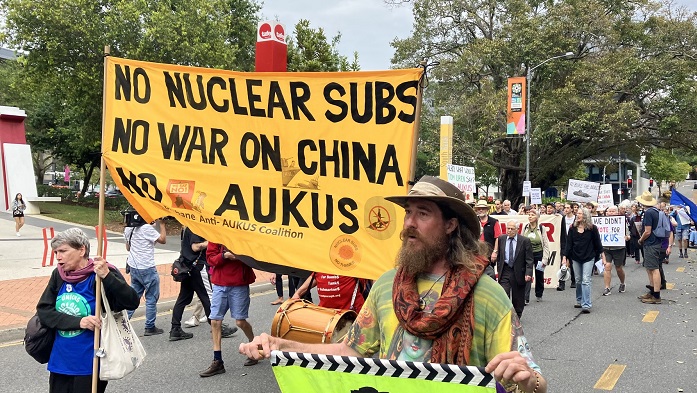Labor’s federal conference in Brisbane backed Anthony Albanese’s strategy for staying in office, one that combines token gestures and “caring” language with a refusal to take real action on issues that matter.
But the leadership’s determination to steamroller opposition to the AUKUS war pact and nuclear submarines demonstrated that behind the soft words is a steely commitment to Australian capitalism.
The Financial Review wrote of Labor, “The discontent [around AUKUS] threatens to erode its national security credentials, which Mr Albanese believes are as important as economic bona fides if Labor is to entrench itself in office.”
In his keynote address, Albanese declared, “Put simply, we seek long-term government because it’s the difference of whether we shape the future or the future shapes us.
“All of this depends, of course, on … demonstrating our responsible approach on everything from the economy to foreign policy to national security, and showing we are capable of bringing people together in the national interest.”
Terms like “responsibility” and “national interest” were signals to the bosses that they have nothing to fear from Labor.
Meanwhile the gap between platitudes and inaction was demonstrated again and again.
Albanese spoke once more about growing up in public housing as thousands of CFMEU construction workers marched on the conference calling for a super profits tax on major corporations to pay for social and affordable housing.
But the party leadership ensured that there was no commitment to taxing the rich. Instead, Albanese announced a scheme helping up to 40,000 lower-paid families to buy a home—a drop in the ocean in a housing crisis.
Environmental groups including the Australian Youth Climate Coalition, Seed Mob, 350.org and Move Beyond Coal protested outside for climate action but Labor refused to commit even to a ban on the logging of native forests.
Delegates voted to increase foreign aid but there will be no restriction on new coal and gas, even though fossil fuels are driving the global heating that is raising the ocean and inundating Pacific islands.
The issue of Palestine was sidelined, with no resolutions or amendments.
Union delegates moved successful amendments to the party’s draft platform—but they were characterised by vague language such as “fair and sustainable” and “should be fully and fairly funded”.
War-mongering
Albanese and Defence Minister Richard Marles staked their credibility on defeating dissent over AUKUS. It was not much of a gamble.
As the Financial Review wrote, “Faction bosses will ensure that PM Albanese is not rolled at the signature event” even though the Left faction had a majority for the first time in four decades.
Three-quarters of the delegates backed their war-mongering and embedded the pact into the party platform.
In the run-up to conference at least 50 Labor branches had voted to oppose AUKUS. There was important criticism of nuclear submarines from unions including the ETU, MUA, CFMEU, AMWU and the ASU.
Opponents of AUKUS pointed out how the $368 billion to be spent on nuclear submarines could be spent on health, education, climate action and more, generating many more jobs.
ETU national secretary Michael Wright noted there was “deafening silence” from AUKUS supporters “about what we’re doing with this waste for the next 100,000 years”.
They were slapped down. Foreign Minister Penny Wong played soft cop, arguing that AUKUS was an instrument of peace while Defence Industry Minister Pat Conroy went in hard, accusing critics of appeasement.
Marles came out all guns blazing in defence of militarism, declaring, “It’s Labor, it has always been Labor which is the true party of Australia’s national defence.”
As anti-war activists protested outside, Albanese stepped up to speak last in the debate, declaring, “Nuclear powered submarines are what Australia needs in the future.”
Under Albanese, Labor has declared itself the party of war.
The anti-AUKUS dissent at the conference was important. Labor Against War reports more branches have voted against AUKUS since.
Far more than a quarter of Labor Party members oppose AUKUS. But the party would not allow a proper vote on the issue at the conference, declaring the motion carried by acclamation so Albanese could save face.
Albanese and Marles won because the Left faction is as committed to winning elections as the Right and so puts “unity” and “electability” ahead of principle.
The campaign to scupper AUKUS and the nuclear subs cannot rely on winning the next ALP conference in three years’ time.
The key is building a movement in the streets and in our workplaces. It is there that the war-mongers will be defeated.
By David Glanz





